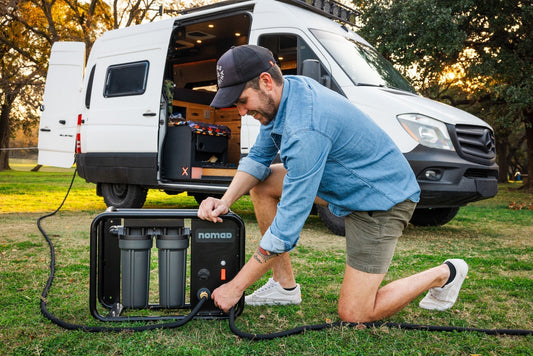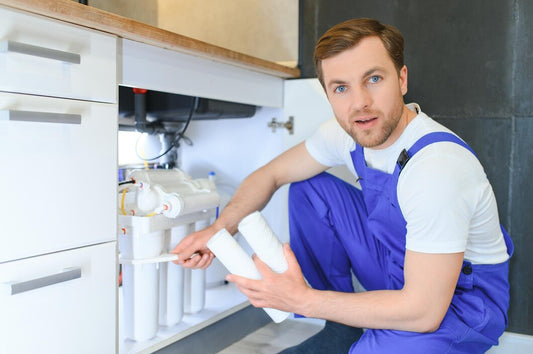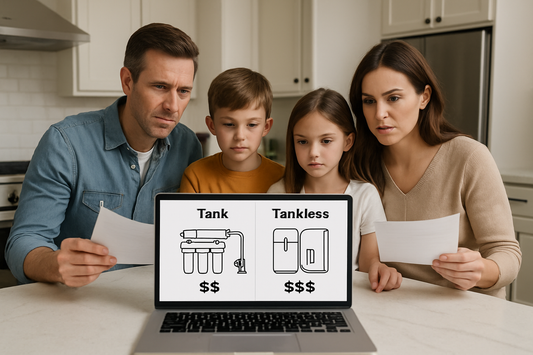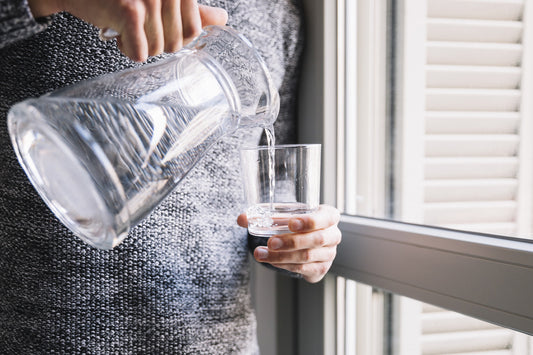Picture this: You turn on your kitchen tap expecting crystal-clear water, but instead, you're greeted with a strange taste, odd smell, or worse—cloudy water. Your once-reliable water filtration system seems to be failing you. Before you panic or call an expensive repair service, take a deep breath. Most water filter system repair issues can be diagnosed and fixed with the right knowledge and approach.
As a homeowner, you've invested in clean water for your family's health and peace of mind. When your system starts acting up, it's not just inconvenient—it's concerning. This comprehensive water filtration maintenance guide will walk you through the most common problems, their solutions, and help you determine when repair makes sense versus upgrading to a newer system.
Understanding Your Water Filtration System's Warning Signs
Your residential water filtration system communicates problems through various symptoms. Recognizing these early warning signs can save you from costly repairs and ensure your family continues enjoying clean, safe water.
Water Quality Changes: The most obvious indicator is deteriorating water quality. If your water tastes different, smells unusual, or appears cloudy, your system is struggling to perform its primary function. This often signals filter saturation, media degradation, or component failure.
Unusual Sounds: A properly functioning system operates quietly with occasional normal cycling sounds. If you hear grinding, loud banging, or continuous running, something's wrong. These audio cues often indicate mechanical issues that require immediate attention.
Pressure Problems: Significant drops in water pressure throughout your home can indicate blockages, clogged filters, or system malfunctions. Conversely, unusual pressure spikes might suggest valve problems or internal component failures.
Essential Home Water Filter Troubleshooting Steps
Step 1: Check Your Power and Electrical Connections
Before diving into complex diagnostics, ensure your system is receiving power. Check circuit breakers, inspect electrical connections, and verify that your system's control panel displays are functioning. Many apparent "system failures" are simply power-related issues that can be resolved quickly.
Step 2: Inspect Your Bypass Valve
The bypass valve is your system's safety mechanism. If water quality issues persist, temporarily bypass your system to determine if the problem originates from your filtration unit or your home's plumbing. This simple test can save hours of unnecessary troubleshooting.
Step 3: Examine Filter Condition and Replacement Schedule
Clogged or expired filters are the most common culprits behind system performance issues. Check your maintenance log—if you haven't replaced filters according to manufacturer recommendations, this is likely your problem. Even if filters appear clean, they may be saturated with contaminants invisible to the naked eye.

Advanced Water Filter System Repair Techniques
Addressing Air Draw Issues in Iron and Sulfur Systems
Many whole-house systems designed for iron and sulfur removal rely on air injection for proper oxidation. When these systems fail to draw air correctly, they can't effectively remove contaminants.
Testing Air Draw Function: During your system's regeneration cycle, listen for characteristic gurgling sounds during the air draw phase. This audible confirmation indicates proper air injection. Silence during this phase suggests a problem requiring attention.
Injector Cleaning and Replacement: The injector is a precision component that facilitates air intake. Over time, mineral deposits and debris can clog these small orifices, disrupting system performance.
To clean your injector:
- Engage your system's bypass valve to maintain water supply
- Disconnect the drain line and allow trapped water to drain completely
- Carefully remove the injector assembly following manufacturer instructions
- Clean the injector with appropriate tools—never enlarge the opening
- If cleaning doesn't restore function, replacement is necessary
Media Replacement: When Repair Isn't Enough
Filter media is the heart of your system's purification process. Over time, even the highest-quality media becomes saturated and loses effectiveness. If you've addressed common issues like clogged injectors and electrical problems but still experience poor water quality, media replacement may be necessary.
Signs requiring media replacement:
- Persistent water quality issues despite filter changes
- Reduced system efficiency and increased cycling frequency
- Unusual tastes or odors that cleaning doesn't eliminate
- System age exceeding manufacturer recommendations

Image by freepik
When to Repair vs. Replace Your Water Filtration System
Repair Makes Sense When:
- Your system is less than 10 years old
- Problems are isolated to specific components
- Replacement parts are readily available and reasonably priced
- The system generally meets your household's water quality needs
Consider Replacement When:
- Repair costs exceed 50% of a new system's price
- Your system frequently breaks down despite regular maintenance
- Your household's water needs have changed significantly
- Newer technology offers substantial efficiency improvements
Modern residential water filtration systems like Crystal Quest whole-house units provide enhanced performance, better efficiency, and improved reliability compared to older systems. If your current system requires frequent repairs, upgrading might be more cost-effective long-term.
Preventive Maintenance: Your Best Defense Against Major Repairs
Monthly Quick Checks
Develop a routine monthly inspection habit. Check for leaks, unusual sounds, and water quality changes. Test your system's bypass function and inspect visible components for wear or damage.
Quarterly Deep Maintenance
Every three months, conduct thorough system cleaning, replace pre-filters, and test water quality. Document your findings to track system performance over time.
Annual Professional Service
Consider annual professional service, especially for complex systems. Professional technicians can identify potential problems before they become expensive repairs and ensure optimal system performance.
For households requiring more advanced filtration, Crystal Quest countertop reverse osmosis system offer superior contaminant removal and require less maintenance than traditional whole-house systems.

Image by pressfoto
Emergency Repair Situations: When to Call for Help
Immediate Professional Intervention Required:
- Significant water leaks or flooding
- Electrical problems or burning smells
- Complete system shutdown with no obvious cause
- Suspected contamination breakthrough
Safety Considerations:
Always prioritize safety during water filter system repair. Turn off power before servicing electrical components, use appropriate protective equipment, and don't hesitate to call professionals when you're unsure about procedures.
Cost-Effective Water Filter Maintenance Tips
Smart Replacement Scheduling
Don't wait for filters to fail completely. Establish a replacement schedule based on your water usage, quality, and manufacturer recommendations. Bulk purchasing replacement filters can reduce long-term costs.
DIY vs. Professional Service
Learn which maintenance tasks you can safely perform yourself and which require professional expertise. Simple filter changes and basic cleaning are typically homeowner-friendly, while electrical work and complex diagnostics should be left to professionals.
System Monitoring and Documentation
Keep detailed records of maintenance activities, repairs, and system performance. This documentation helps identify patterns, optimize maintenance schedules, and makes warranty claims smoother.
Conclusion: Empowering Your Water Filter System Repair Journey
Water filter system repair doesn't have to be overwhelming. With proper knowledge, regular maintenance, and attention to warning signs, you can keep your system running efficiently for years. Remember that while many issues can be resolved through DIY repair, knowing when to call professionals or consider system replacement is equally important.
Your family's health and comfort depend on clean, safe water. By mastering these troubleshooting techniques and maintenance practices, you're taking control of your home's water quality while protecting your investment in filtration technology.
Whether you're dealing with a simple filter change or considering a complete system upgrade, the key is staying informed and proactive. Your future self—and your family—will thank you for the effort you invest in maintaining your water filtration system today.





